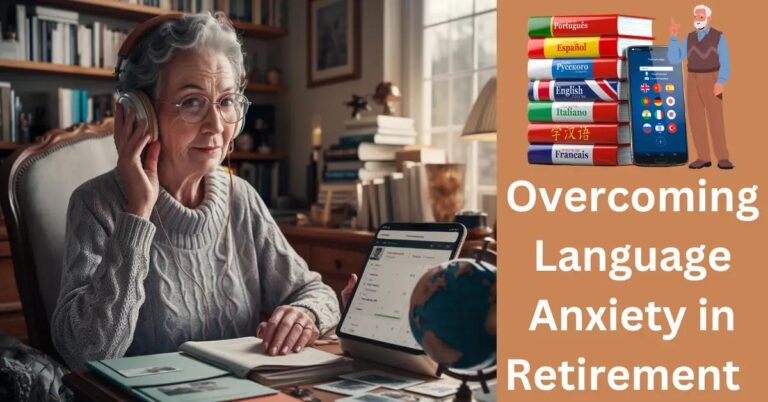TL;DR:
- Seniors can learn new languages to boost memory and delay dementia.
- Speaking multiple languages enhances social interaction and travel experiences.
- Learning languages increases self-esteem and emotional growth.
- Language classes for seniors offer community and cultural engagement.
- Choose languages like Spanish or Mandarin for social and economic opportunities.
- Personal ties or travel interests can guide language choice.
- Effective learning strategies include adaptive methods, flashcards, and routines.
- Technology such as apps, online courses, and language exchanges aid learning.
- Stay motivated by integrating language learning with hobbies and social events.
- Lifelong language learning enhances cognitive health and enriches retirement life.
Thinking of exploring new adventures in retirement? Learning multiple languages could be your next great journey! It sharpens your mind, bolsters your memory, and can even keep dementia at bay. Imagine feeling confident while chatting at local markets or during exotic travels. You'll join vibrant classes and meet new friends. Over time, exploring different languages enriches your life, enhancing both brain health and cultural experiences. Let's dig into why this could be your most rewarding retirement adventure yet!
Why Should Seniors Learn Multiple Languages?
Can a 70-year-old person learn a new language? Absolutely! Age does not stop us from learning new things, including a language. It sharpens our minds and boosts our memory. For example, language learning can delay the onset of dementia. It keeps our brains sharp and active, like a workout for the mind.
Does knowing two languages benefit you? Yes, it can open up many social doors. Joining a language class brings community involvement. You meet new friends and enjoy fun activities together. This social interaction is not just about language. It’s about connecting with people and staying engaged with the world.
Emotionally, learning a language can increase self-esteem. You feel proud of each new word mastered. This confidence fosters lifelong curiosity. Learning naturally makes us eager to discover more of the world.
Languages do more than offer brain boosts. They also make travel a richer experience. Imagine visiting Italy and chatting with locals in Italian. You understand their culture better and feel part of their community. Languages build a bridge to cultural engagement, making travel more rewarding.
Multilingualism keeps the brain healthy. Studies show those who speak more than one language have healthier brains. Speaking two languages exercises different brain parts, which can keep our brains fit.
Language learning is about staying vibrant as we age. Exploring new languages can revitalize our lives, connecting our minds, hearts, and communities. Speaking multiple languages is like holding a magic key. It unlocks cognitive benefits, such as memory improvement, emotional growth, and new social opportunities. Let's embrace the challenge and form new pathways in our minds and lives. Learning languages is worth the time and effort, especially in our golden years.
Which Language to Choose in Retirement?
When thinking about a new language to learn, one might wonder, "What language should I choose?" Opt for one with social or economic importance, like Spanish or Mandarin. These languages can open doors to new social circles and offer travel benefits. Spanish, for instance, is widely spoken in the Americas and Europe, while Mandarin is crucial in business worldwide. Learning these languages offers the chance to engage with diverse cultures more deeply.
Travel is one of retirement's great joys. Knowing a new language enhances these experiences by connecting on a personal level with locals. Imagine ordering your meal in a Paris café or asking for directions in Japan with ease. Such moments make travel richer and more rewarding, creating unforgettable memories.
Furthermore, language can bridge the gap between cultures. It allows you to delve into literature, art, and traditions with greater understanding. This cultural literacy fosters a deeper connection to the world around us and a richer appreciation for its diversity. Language learning helps in seeing the world from different perspectives.
Choosing a new language can also be about personal ties. For some, it means connecting or reconnecting with family roots. Speaking a language spoken by your ancestors allows for deeper family bonds and a greater sense of identity. It can also mean learning the language your grandchildren speak at home, enabling communication without barriers.
Many communities offer local language clubs or meetups where you can practice your skills. These clubs are perfect for friendly exchanges and learning outside of textbooks. Meeting others who are learning provides motivation and a sense of community. Such groups often organize cultural events, enhancing the learning experience by making it practical and fun.
Language learning is a journey that varies for everyone. Whether you choose a language for travel, cultural literacy, personal growth, or connecting with family, it enriches your retirement. Use local resources like language clubs to apply your skills, share with others, and enjoy the journey of lifelong learning.
What are the Best Language Learning Strategies for Seniors?
You may wonder, "Is it more difficult to learn a language as you get older?" Precision tells us that it might be but not impossible! With a few good approaches, learning can be fun and easy. First, look at adaptive language methods for seniors. These methods consider the specific needs of older learners. They aim to make learning smooth and effective.
Now, let's talk about retaining vocabulary. Try flashcards to remember words. Use them daily to see progress. To better your pronunciation, listen closely to native speakers. Imitate their sounds to improve your speech. Another good idea is to read aloud. This practice helps you become confident and clear.
Creating language routines is very helpful. Setting aside time each day builds a steady habit. This routine provides structure and reduces language anxiety. You might feel nervous speaking a new language. But with practice comes ease. Be patient with yourself and celebrate progress.
To keep learning fun and engaging, try memory games. These games boost vocabulary and keep the mind sharp. Many of these games also promote cognitive fitness. The benefits extend beyond learning a language. They help keep your brain active and healthy in other ways.
For a unique twist, explore unconventional learning paths. Think about language podcasts or YouTube channels with topics you love. These resources spark joy and curiosity. They make learning a language feel like an adventure. Moreover, they break the usual learning patterns and bring excitement.
Sometimes, learning multiple languages can feel overwhelming. Sites like Reddit offer communities where learners share tips and experiences. You can find support and advice from like-minded learners there. This sense of community can help keep motivation alive and provide new insights.
In short, with smart planning and engaging methods, learning new languages in retirement is more than possible. It's an enriching journey for both your mind and spirit!
How Can Technology Aid Language Learning for Retirees?
Technology opens doors for seniors learning languages. Mobile apps help with daily practice. Apps like Duolingo and Babbel are popular. They offer simple lessons and keep learning fun.
Online language courses support retirees. They have flexible schedules and cater to seniors. Websites like Coursera and edX offer these courses. Users can learn at their own pace.
Communities online are helpful too. People join forums to chat and practice languages. It's a great way to connect with others. Seniors can find groups on platforms like Facebook.
Public libraries now provide digital tools. These include e-books and language audio files. Libraries often have free access to language programs as well. This makes it easier for retirees to access resources.
Self-paced courses online suit different learning styles. Seniors can choose topics of interest. Websites like Rosetta Stone offer varied materials. These courses let learners explore languages comfortably.
Online language exchanges increase interaction. Websites like Tandem connect language students. Retirees chat with native speakers worldwide. This boosts confidence and improves skills.
Virtual language clubs bring people together. Clubs discuss culture and share ideas. Platforms like Meetup host these gatherings. They foster growth and make learning enjoyable.
Multilingual platforms offer various tools. Google Translate is handy for quick translations. It helps learners understand new words fast. These tools enhance learning experiences.
Retirees learn languages with diverse technology options. Digital solutions make the process engaging. Seniors find learning rewarding and manageable this way.
How to Stay Motivated and Engaged in Language Learning?
To stay motivated in learning, find stories of others like you. I have met seniors who became fluent in Italian, making new friends and connections. Their experiences inspire and show the potential of learning late in life. But how do they stay enthused? They immerse language studies into their retired lives, blending with daily hobbies.
Finding the right balance in retirement is key. One friend merges French studies with his gardening hobby. He listens to French podcasts while he gardens, combining leisure and study seamlessly. Another joins a Spanish club at the community center. They host lunches where they practice Spanish with fun, themed cooking days. Balancing language practice with hobbies like this makes learning enjoyable.
Lifelong learning is vital for staying active in mind and spirit. Learning keeps your brain fit and offers a mission in life. This is crucial, especially when other areas slow down. It’s proof that retirees can learn new tricks and thrive doing it.
To keep interest alive, set small targets and celebrate when you meet them. Try something new, like reading a book or watching a movie in the language you study. It’s rewarding to grasp ideas without subtitles, and it shows real progress.
Joining language-based social events can also assist. Some retirement communities host language exchange nights. These are casual and social, yet drive progress with real conversations. Engaging in meaningful language projects, like translating stories or teaching young kids simple words, can feed your purpose.
Language learning can be an exciting chapter in retirement. The key is to weave it into your lifestyle, keep it lively, and enjoy the ride. I believe that every word learned is a step toward a more connected, enriched life.
Conclusion
Learning a new language keeps your mind sharp and your heart open. We've looked at memory boosts, social perks, and how it wards off dementia. We've explored choosing the right language and using technology to learn it. Now, pick a language that excites you and fits your lifestyle. Embrace challenges and stay curious. Engage with apps, clubs, and communities. Keep learning and enjoy the journey. Your brain and spirit will thank you!







